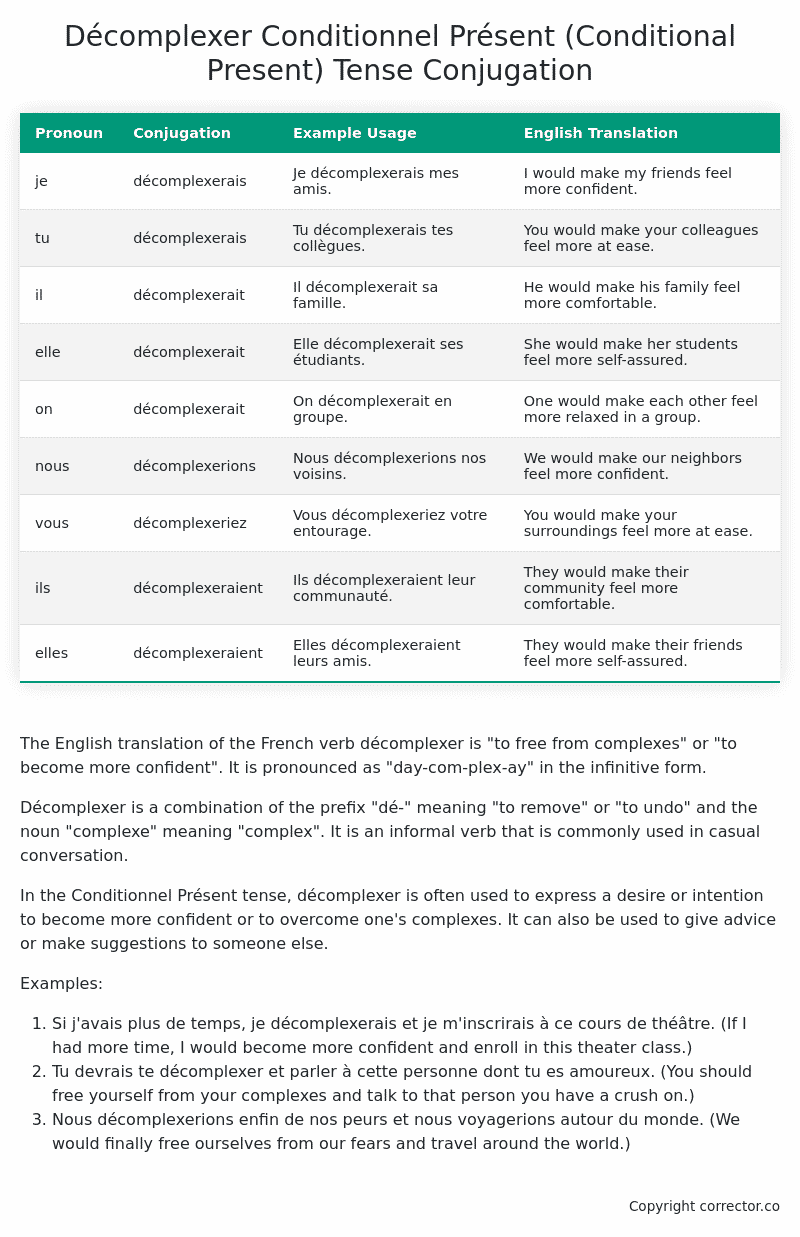Conditionnel Présent (Conditional Present) Tense Conjugation of the French Verb décomplexer
Introduction to the verb décomplexer
The English translation of the French verb décomplexer is “to free from complexes” or “to become more confident”. It is pronounced as “day-com-plex-ay” in the infinitive form.
Décomplexer is a combination of the prefix “dé-” meaning “to remove” or “to undo” and the noun “complexe” meaning “complex”. It is an informal verb that is commonly used in casual conversation.
In the Conditionnel Présent tense, décomplexer is often used to express a desire or intention to become more confident or to overcome one’s complexes. It can also be used to give advice or make suggestions to someone else.
Examples:
- Si j’avais plus de temps, je décomplexerais et je m’inscrirais à ce cours de théâtre. (If I had more time, I would become more confident and enroll in this theater class.)
- Tu devrais te décomplexer et parler à cette personne dont tu es amoureux. (You should free yourself from your complexes and talk to that person you have a crush on.)
- Nous décomplexerions enfin de nos peurs et nous voyagerions autour du monde. (We would finally free ourselves from our fears and travel around the world.)
Table of the Conditionnel Présent (Conditional Present) Tense Conjugation of décomplexer
| Pronoun | Conjugation | Example Usage | English Translation |
|---|---|---|---|
| je | décomplexerais | Je décomplexerais mes amis. | I would make my friends feel more confident. |
| tu | décomplexerais | Tu décomplexerais tes collègues. | You would make your colleagues feel more at ease. |
| il | décomplexerait | Il décomplexerait sa famille. | He would make his family feel more comfortable. |
| elle | décomplexerait | Elle décomplexerait ses étudiants. | She would make her students feel more self-assured. |
| on | décomplexerait | On décomplexerait en groupe. | One would make each other feel more relaxed in a group. |
| nous | décomplexerions | Nous décomplexerions nos voisins. | We would make our neighbors feel more confident. |
| vous | décomplexeriez | Vous décomplexeriez votre entourage. | You would make your surroundings feel more at ease. |
| ils | décomplexeraient | Ils décomplexeraient leur communauté. | They would make their community feel more comfortable. |
| elles | décomplexeraient | Elles décomplexeraient leurs amis. | They would make their friends feel more self-assured. |
Other Conjugations for Décomplexer.
Le Present (Present Tense) Conjugation of the French Verb décomplexer
Imparfait (Imperfect) Tense Conjugation of the French Verb décomplexer
Passé Simple (Simple Past) Tense Conjugation of the French Verb décomplexer
Passé Composé (Present Perfect) Tense Conjugation of the French Verb décomplexer
Futur Simple (Simple Future) Tense Conjugation of the French Verb décomplexer
Futur Proche (Near Future) Tense Conjugation of the French Verb décomplexer
Plus-que-parfait (Pluperfect) Tense Conjugation of the French Verb décomplexer
Passé Antérieur (Past Anterior) Tense Conjugation of the French Verb décomplexer
Futur Antérieur (Future Anterior) Tense Conjugation of the French Verb décomplexer
Subjonctif Présent (Subjunctive Present) Tense Conjugation of the French Verb décomplexer
Subjonctif Passé (Subjunctive Past) Tense Conjugation of the French Verb décomplexer
Subjonctif Imparfait (Subjunctive Imperfect) Tense Conjugation of the French Verb décomplexer
Conditionnel Présent (Conditional Present) Tense Conjugation of the French Verb décomplexer (this article)
Conditionnel Passé (Conditional Past) Tense Conjugation of the French Verb décomplexer
L’impératif Présent (Imperative Present) Tense Conjugation of the French Verb décomplexer
L’infinitif Présent (Infinitive Present) Tense Conjugation of the French Verb décomplexer
Struggling with French verbs or the language in general? Why not use our free French Grammar Checker – no registration required!
Get a FREE Download Study Sheet of this Conjugation 🔥
Simply right click the image below, click “save image” and get your free reference for the décomplexer Conditionnel Présent tense conjugation!

Décomplexer – About the French Conditionnel Présent (Conditional Present) Tense
Formation
Common Everyday Usage Patterns
Expressing Polite Requests
Expressing Hypothetical Situations
Expressing Doubt or Uncertainty
Interactions with Other Tenses
Present Tense
Past Tense
Future Tense
Conditional Perfect
Summary
Want More?
I hope you enjoyed this article on the verb décomplexer. Still in a learning mood? Check out another TOTALLY random French verb conjugation!


